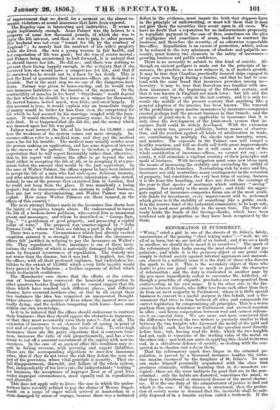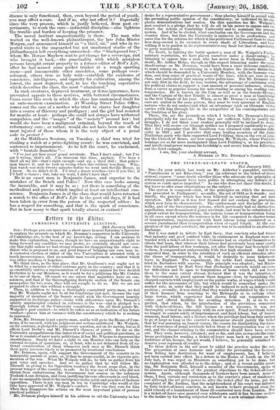REFORMATION IN PUNISHMENT - .-
"WELL" cried a girl in one of the streets of St. Giles's, lately, unconscious of the passing " chiel taking.notes"—" well, we are all of us born, but we are not all of us buried ; and if we see a fault in another, we should try to mend it in ourselves." The spark of the reformatory idea lurks among. the most abandoned of our po- pulation; and while it is the primary object of our penal code simply to defend society against internal aggressors and maraud- ers, almost in a military sense it is the duty of those who discern the spark to fan it. This is the secondary object of those who desire to give our penal code as much is possible the character of reformation ; and the duty is vindicated in another page by the pen most immediately suited to encounter Mr. Adderley, al- though a punctilio of etiquette precludes our correspondent from controverting in his own name. It is the other side in the dis- cussion between friends, who differ less from each other than they do from an inert majority in Parliament, whom it is their special business to convert to a useful purpose in this behalf, and a Go- vernment that tries to trim between all sides and compounds for correct legislation by compromising all principles. This is a worse position than open resistance in Parliament and avowed reaction in office ; and hence cooperation between real and earnest reform- ers is an especial duty: We are more and more convinced that the difference between the two writers is precisely similar to that between the two knights who discussed the metal of the gold and silver shield : each has his own half of the question most directly before him ; but, having read the fable, Which the two knights had not, each is conscious of the sterling value of the metat on the other side ; and both can unite in applying this shield to its true end, in a chivalrous defence of society, so dealing with the con- quered as to chasten and redeem them. That the reformatory spark does linger in the criminal po- pulation, is proved by a thousand instances besides the virtu- ous maxim enounced by the daughter of fgt. Giles's. No man can make himself personally acquainted with the class that produces criminals, without learning that in it—monsters ex- cepted—there are the same instincts for good that are in the non- criminal ; only the habits are distorted, sometimes the mind, so that there is functional or structural disease of the moral charac- ter. It is the one duty of the administrator of justice to find out which is the case : if the disease is structural, then the protec- tion of society seems to demand. that the incurable shall be suit- ably disposed of in a lunatic asylum called a bridewell. If the
disease is only functional, then, even beyond the period of youth, you may effect a cure. And if so, why not effect it ? Especially since the very process, which is justly believed, from past ex- periments, to work the cure—industrial discipline—also lightens the trouble and burden of keeping the prisoner.
The moral instinct unquestionably is there. The man who waited on the well-known philanthropist, the late John Minter Morgan, and announced himself as a thief, sir," and who in re- peated visits to the unguarded but not Unadorned studio of the philanthropist left everything untouched—the "blackguard boy," whom Mr. Horace Mayhew sent to get change for a sovereign, and who brought it back,—the punctuality with which mistaken persons brought errant property to a former editor of Bell's life after he had missed some pocket trinket at a rough sporting scene—and innumerable other anecdotes some perhaps over- coloured, others true as holy writ—establish the existence Of conscience, intelligence, and capacity for cultivation, among the lowest, the most depraved, and, to use the touching superlative which describes the class, the most "abandoned."
In such creatures, depraved treatment, or dense ignorance, have prevented appeals to those motives, with bettered circumstances. Cases occur this week in which the class has anatomized itself for an ante-mortem examination. At Worship Street Police Office, comes out the case of a mother who tried to starve her daughter into a course of thievery and profligacy; and the girl had resisted for months at least: perhaps she could not always have withstood compulsion and the "usages" of the "society" around her : but would she have been a malignant criminal, beyond the reach of reformatory cure ; or rather, would she not have been one of the most injured of those whom it is the very object of a penal code to protect ?
At the Middlesex Sessions, on Tuesday, a thief was tried for stealing a watch at a prize-fighting resort: he was convicted, and sentenced to imprisonment. As he left the court, he exclaimed, with " brutale franchise "-
"I've just got four years' penal servitude. That / don't mind ; but I've got it wrong, that's all. I'm innocent this time, anyhow. I've been a thief all my life—that's right enough—and am a thief still ; that police- man knows it, and he took us wrong when this robbery was done. Why, that watch was stole twenty minutes before we went into Saville House, as I know. So we didn't do it. I'd steal a dozen watches—two if you like, if I'd half a chance ; but, take my word, I didn't have that." He is an exact man is Benjamin James, and superior to- the mistakes of the Bench and Mice ! Now this ease looks among the incurable and it may be so ; yet there is something of the methodical and precise which implies at least an intellectual con- science. Benjamin James is of the class that would have returned a watch to the office of Bell's Life in the good old days, if it had been taken in error from the person of the respected editor: he has a respect for something, and that is the spark of conscience. But in how many is that spark totally absent or extinct ?



























 Previous page
Previous page